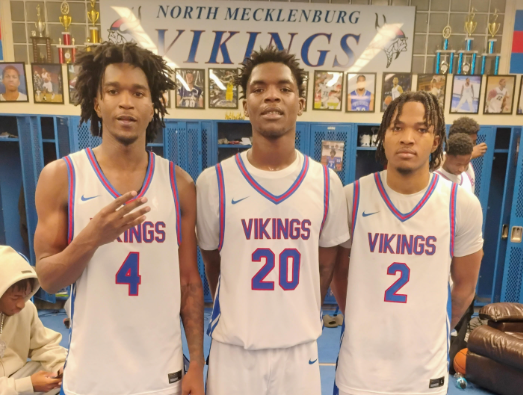
SAD SAM’S GAME OF THE WEEK RECAPGreetings HS hoops junkies from across the Valentining Piedmont! The Great One is here to recap his final regular season Game of the Week. For the regular season finale we visited North Meck as the Vikings were welcoming their old friends from West Charlotte. There was much more than just rivalry bragging rights on the line on Senior night in Huntersville. West Charlotte had a chance to grab a share of the regular season Power 6 conference title with a win. The Lions started off the 1st quarter with utilizing the physicality of Kaharri Coleman to drive the lane and score or create. Coleman finished the quarter with 10 points but 6 three balls from the Norsemen gave North Meck a 24-16 lead. The Lions would make a run in the 2nd frame as Chacho Womack became involved putting up 8 points. Alek Lewandowski posted 7 in the quarter to keep a slim 43-41 lead for the Vikings at the half. Exzavier Young took advantage of Jkhai Wade picking up his 4th foul early in the 3rd quarter and racked up 9 points in the quarter. Coleman and Womack kept the Lions close with 6 each in the 3rd, making the score 65-60 North Meck. The 4th frame continued to be nip and tuck but Wilson Estwick had key steals and one with 2:55 left gave the Vikings command and an 8 point lead. Young continued to control the paint tallying 8 in the 4th but Womack and Coleman tallied 8 and 6 respectively to keep the Lions close. Womack’s 3 with 22.0 seconds left cut the Viking margin to 4 but Estwick closed out the Lions with 4 free throws preserving an 85-79 decision securing the outright conference title. Ashton Pierce was steady throughout for North Meck, chalking up 19. Coleman would finish with 29 and Womack tallied 22 after a slow start leading the West Charlotte effort. Young would finish with 19 and 10 rebounds and Estwick chipped in 16 points and 3 steals for the Vikings, who close out the regular season 20-4 and have the top seed in this week’s Power 6 tournament. Lewandowski finished with 17 of his own. The Lions finish the regular season at 18-5 and are the 2 seed in the tournament, so Round 3 could be coming later this week.
The Sadster gives out kudos to a couple of unsung hero performances. Sophomore Carter Sullivan gave the Lions a spark off the bench scoring 9. For the Vikings, Junior Ethan Pack scored 6 points and snatched 3 steals of his own, giving his team a boost.